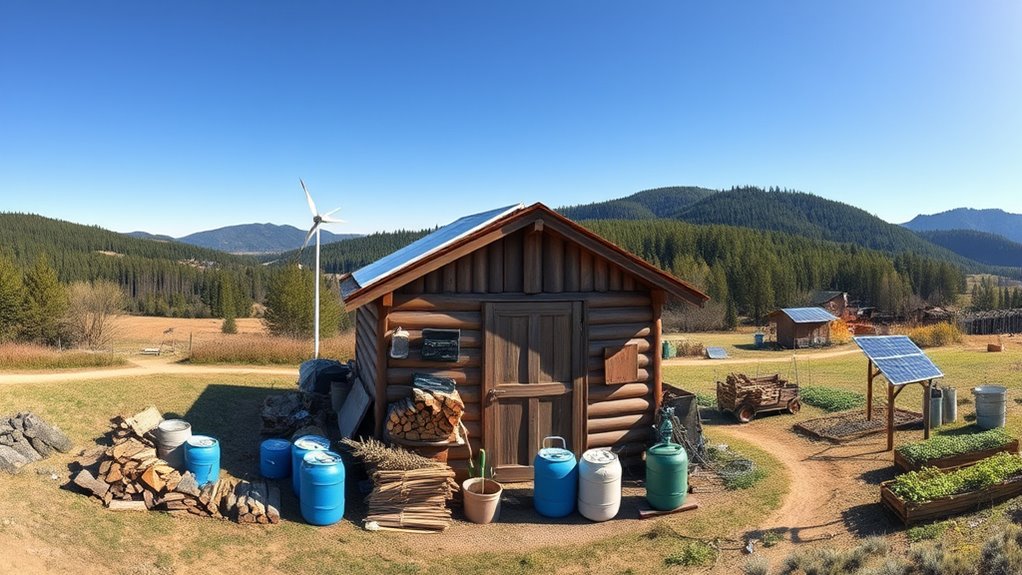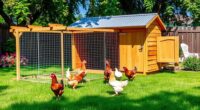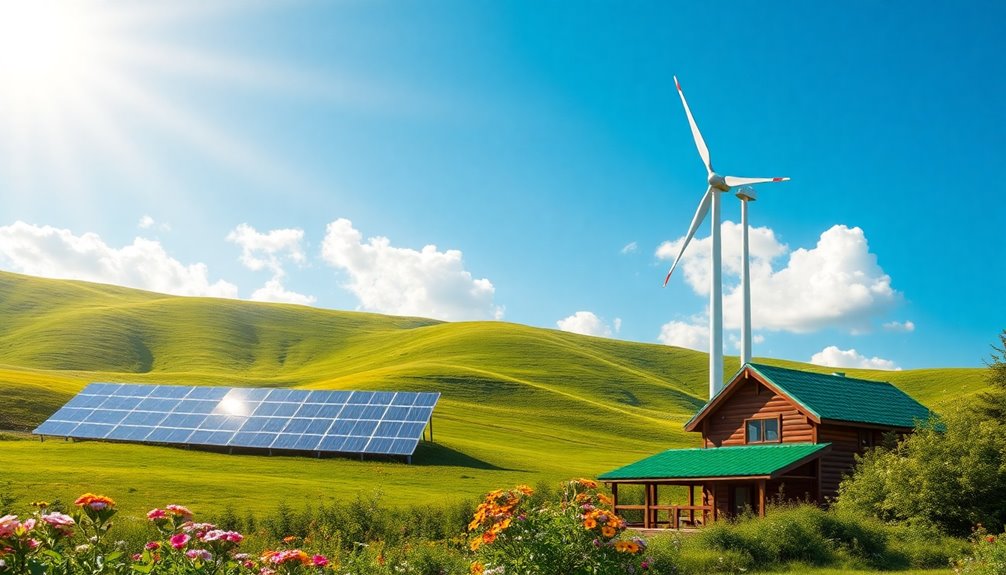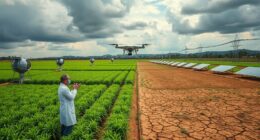To prepare for emergencies on your off-grid farm, guarantee reliable power with solar, batteries, and backup generators, and maintain your water filtration and storage systems to prevent contamination. Keep safety gear, communication devices like satellite phones, and emergency supplies accessible at all times. Practice safety drills and develop clear procedures for power or water failures. Staying proactive helps you handle crises confidently—continue exploring how to strengthen your farm’s resilience even further.
Key Takeaways
- Maintain reliable power with solar systems, batteries, and backup generators, and perform regular system maintenance.
- Install multi-stage water filtration and store sufficient potable water for emergencies.
- Develop and practice emergency plans, including safety drills and quick response procedures.
- Equip the farm with satellite phones, radios, and safety gear, and regularly test communication devices.
- Conduct routine system checks and keep emergency supplies accessible to ensure self-sufficiency and resilience.

Living on a remote off-grid farm offers independence and tranquility, but it also requires careful planning for emergencies. When you’re miles away from town and traditional services, being self-sufficient becomes essential. One of the most critical aspects is guaranteeing you have reliable power sources. Solar power is an excellent solution because it provides a clean, renewable energy supply that can keep your lights, communication devices, and essential appliances running during power outages or cloudy days. Setting up a robust solar panel system with batteries ensures you won’t be left in the dark when the sun isn’t shining. Regular maintenance and monitoring of your solar setup are crucial, especially in remote locations where repairs might take longer. Combining solar power with backup generators can add an extra layer of security, so you’re prepared for extended periods without sunlight. Additionally, understanding the importance of proper system maintenance can prolong the lifespan and efficiency of your energy setup.
Water security is equally important, as your water source might be limited or vulnerable to contamination. Installing a high-quality water filtration system safeguards you against waterborne illnesses and ensures access to clean drinking water. This system should include multiple stages—such as sediment filters, carbon filters, and UV sterilization—to remove impurities, bacteria, and viruses. It’s wise to have spare filters on hand and regularly test your water quality to catch any issues early. Relying solely on natural sources like wells or streams increases the risk of contamination, so having a reliable filtration system is a must. Additionally, storing a sufficient supply of potable water provides peace of mind during emergencies like droughts or supply chain disruptions.
Planning for emergencies also means having a clear understanding of your water and power needs. Calculate your daily consumption and ensure your solar and filtration systems can meet those demands even during periods of increased use or bad weather. Keep safety equipment nearby, such as fire extinguishers, first aid kits, and emergency communication devices like satellite phones or radios, since cell service may be unreliable. Regularly practicing emergency drills helps you and your family stay prepared and aware of procedures in case of natural disasters, medical emergencies, or equipment failures. By proactively maintaining your solar and water systems, you minimize vulnerability and enhance your farm’s resilience. Ultimately, the goal is to develop a reliable off-grid infrastructure that keeps you safe, healthy, and self-sufficient, no matter what challenges come your way.
Frequently Asked Questions
How Do I Communicate During a Power Outage?
During a power outage, you can stay connected by using solar-powered communication devices and emergency radios. Keep these devices charged and ready, so you can listen for updates or call for help when needed. Solar communication is reliable off-grid, and emergency radios work independently of the power grid. Make sure to test them regularly, store spare batteries, and keep them accessible to make certain you’re prepared for any outage.
What Are the Best Backup Water Sources?
You should always have backup water sources on hand because a chain is only as strong as its weakest link. Rainwater harvesting provides a sustainable, off-grid solution, while well water maintenance guarantees your existing well remains reliable. Keep extra supplies of bottled water and consider installing a filtration system. These steps help you stay prepared when emergencies strike, giving you peace of mind knowing you won’t be caught short.
How Can I Protect Livestock From Emergencies?
To protect your livestock from emergencies, prioritize farm security by installing sturdy fencing and surveillance. Guarantee they have ample livestock nutrition with stored feed and supplemental rations to withstand disruptions. Keep emergency supplies like water and veterinary kits nearby. Regularly monitor their health and security, and develop a plan for quick evacuation or shelter. These steps help safeguard your animals and maintain their well-being during unforeseen events.
What Insurance Options Cover Off-Grid Farm Disasters?
Think of your off-grid farm as a fortress, and insurance as your shield. You should consider property liability insurance to protect against damages, and crop insurance to safeguard your harvests from disasters. These options cover farm structures, equipment, and crops, ensuring you’re financially protected when nature throws a curveball. By securing these policies, you’re building a safety net that keeps your farm resilient through any storm.
How Do I Plan for Medical Emergencies Remotely?
To plan for medical emergencies remotely, you should guarantee your medication storage is secure and organized, so you can quickly access necessary medications. Additionally, set up reliable telemedicine access, so you can consult healthcare professionals when needed. Keep a list of local emergency contacts, and consider having a first aid kit tailored to your needs. Regularly review and update your emergency plan to stay prepared for any situation.
Conclusion
By planning ahead and staying vigilant, you turn potential chaos into calm. Remember, preparedness isn’t just a safety net—it’s your shield against the unknown, a steady heartbeat in the silence of isolation. Embrace the steps, trust your instincts, and keep your farm resilient. In the dance of nature and uncertainty, your readiness writes the rhythm—steady, confident, unwavering. Stay prepared, stay safe, and let your farm thrive beyond the storm.










